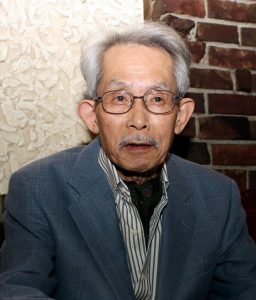Views on Ukraine invasion from A-bombed Hiroshima’s perspective: Mitsuru Kurosawa, 77, professor emeritus, Osaka University
Apr. 21, 2022
Current situation represents opportunity to make progress on nuclear disarmament
by Kana Kobayashi, Staff Writer
With Russia’s invasion of Ukraine, the global framework for nuclear disarmament is on the verge of collapse. As the number of A-bomb survivors who continue to share the reality of the atomic bombings continues to decline, the Intermediate-Range Nuclear Forces (INF) Treaty between the United States and Russia, two nuclear superpowers, expired in 2019. Moreover, only four years remain until expiration of the new Strategic Arms Reduction Treaty (START), which managed to be extended last year. To reconstruct the framework, it is necessary to bring the war in Ukraine to an end quickly.
The Nuclear Non-Proliferation Treaty (NPT) Review Conference, scheduled to be held later this year in August, will feature Russia as one of the treaty member nations. With its recent actions, that country will not be able to avoid criticism expected to be leveled at it by other members. Even if the war should end by then, political decisions will probably not have been made yet. Difficulties are anticipated to arise at the conference in terms of reaching an agreement on nuclear disarmament and in adopting a consensus final document.
Everyone needs to recall what happened in 1962 following the Cuban Missile Crisis, during which tensions about nuclear war were heightened. In 1963, the Partial Test Ban Treaty (PTBT) was signed among the United States, the Soviet Union, and the United Kingdom. Then, in 1970 the NPT entered into force. In that way, after the Cuban Missile Crisis nations across the globe moved in the direction of reducing nuclear arms. In this most recent conflict, Russian President Vladimir Putin has hinted at the use of nuclear weapons. In the same way, it will be important to seize the current situation as an important opportunity.
To take advantage of that opportunity, the United States and other nuclear nations need to get a fresh start on nuclear disarmament initiatives. In January, the leaders of the five nuclear weapons states—the U.S., Russia, the U.K., France, and China—released a joint statement announcing, “We affirm that a nuclear war cannot be won and must never be fought.” Those nations should begin to carry out concrete actions based on that statement.
Japan’s national government has announced its desire to serve as a bridge between nuclear and non-nuclear weapons states. But in reality the country has depended to a great degree on the nuclear-armed United States. If the government wants to act as a bridge, it must maintain a position of neutrality. When it comes to the Treaty on the Prohibition of Nuclear Weapons (TPNW), which Japan has yet to ratify, the government should declare that it will make an effort to ratify the TPNW.
In addition, the Japanese government should make an effort to provide policymakers in nuclear nations the opportunity to visit the A-bombed cities of Hiroshima and Nagasaki. Precisely because the world now faces a dangerous situation presented by the threat of use of nuclear weapons, we need to return to the starting line. As someone who has continued to conduct research on disarmament issues, I had the meaningful experience of visiting Hiroshima Peace Memorial Park, in that city’s Naka Ward, before going off to college.
I truly hope that hosting of the summit meeting of the G7 (Group of Seven industrialized nations) in the A-bombed city of Hiroshima, U.S. President Biden’s visit to the city, and other objectives can be achieved. To that end, I want people in Hiroshima to continue expressing their experiences and opinions to the global community.
Profile
Mitsuru Kurosawa
Born in Osaka, Japan in 1945, Mr. Kurosawa graduated from the doctoral program at Osaka University’s Graduate School of Law and Politics. He has served in such positions as advisor for the Japanese government delegation to the NPT Review Conference, and as the first chairperson of the Japan Association of Disarmament Studies. His specialty is international law in the area of disarmament.
(Originally published on April 21, 2022)








